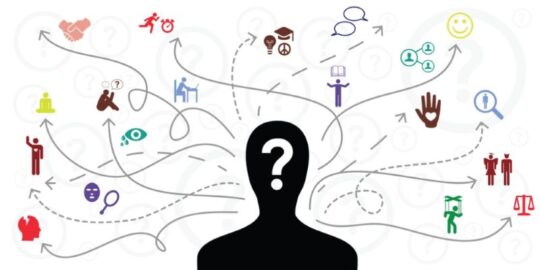The 5 Big Identity Traits in Personality Psychology

Learn about the 5 Big Identity traits in Personality Psychology
Personality psychology is a growing area of study which allows us to understand more about ourselves and other people. We can identify our personality by using the Big Five personality traits, also known as OCEAN model. In this post, we look at some key topics relating to research on identity and tackle some commonly asked questions about personality psychology and 5 Big traits to understanding yourself better.

What is personality psychology?
Personality psychology involves the study of the human mind (or brain), using scientifically-based methods or techniques. It focuses on how individual differences in the human mind, thoughts, feelings affect human behavior.
Generally speaking, psychologists are identifying the repeating patterns in our mental activity and behavior, that allow them to predict and infer a person’s reaction, desires, attitudes, values, and more.
But what does “personality” actually mean?
The word personality comes from the Latin word Persona which in translation stands for “mask”. Many people have a sense of what personality is but are unsure of how to define it. Psychologists have been trying to figure out how to define it since Freud introduced his famous model of personality which divided the human mind into three components (the id, the ego, and the super-ego). But a breakthrough came in the 1980s when trait theory was developed. Trait theory defines personality as a collection of “traits” or characteristics. These “traits” can be understood as habitual (repeated) patterns of behavior, thought, and emotion.
Personality and human behavior were studied and debated for centuries. For some that adopt a deterministic position, behavior is pre-determined, beyond their control. For others, behavior is always a conscious decision guided by Free-will.
Another debatable point is nature versus nurture, where one part believes that personality is determined by genetic factors and the other part believes that personality is modeled by the environment and experiences accumulated along the way.
Thanks to scientific research we now know that all of these perspectives were right in their own way. Personality is a fluid construct that evolves over time based on external factors but also it’s structured by our biological internal factors, like a tree that grows from a seed.
What are the most important aspects of the human personality?
According to trait theory, there are four fundamental aspects of the human personality. If we understand these three aspects, we can begin to understand what “personality” actually means, in a scientific, technical sense.
The three fundamental aspects of human personality are:
- Personality is unique to individuals, thanks to our unique biological profile and life experiences;
- Personality is largely consistent and tends to change very little over time if the same environment is maintained.
- Change in personality is possible, depending on how drastic will the new changes be, personality will reflect that; For example A different environment, a new set of skills, a change in habits(repetitive behavior)
- Personality influences our behavior, affecting the choices we make, the actions we take, and the feelings we experience every day.
What is the Big Five Model of personality?
The “Big Five” model of personality was developed using trait theory. It is by far the most widely accepted and widely used model of the human personality, used by psychologists around the world. The model contains five key personality traits, which encompass the entirety of the human personality. These five traits apply to all genders, age groups, and cultures. The Big five traits are present in all humans, be it a hunter from an Amazonian tribe or a lawyer from New York.
Each of these 5 traits is encompassing a wide array of personality characteristics and each of them has two opposing extremes(positive and negative). For example, the trait Agreeableness (which is one of the five traits) contains such personal characteristics as friendliness, compassion or humility; on the negative side, if a person scores low on Agreeableness, he/she could be described as conflictual, aggressive or stubborn.
What are the five traits that make up the “Big Five” model?
The “Big Five” traits are:
- Openness (to experience): Openness describes the tendency to seek new experiences, the tendency to be creative, and the tendency to enjoy intellectual pursuits.
- Conscientiousness: Conscientiousness describes the tendency to be hardworking, industrious, orderly, and organized.
- Extraversion: Extraversion describes the tendency to seek out and enjoy social activities.
- Agreeableness: Agreeableness describes the tendency to be cooperative, kind, sincere, empathetic, and understanding. It also describes the desire to please others.
- Neuroticism: Neuroticism describes emotional instability and the tendency to experience negative emotions (including anxiety, depression, and other mental-health-related conditions).
How do psychologists apply the “Big Five” traits to people?
Psychologists test people through a questionnaire with multiple answers and give them measurements or “scores” on each of the five traits. These scores indicate the degree to which each trait applies to the individual (or how strongly each individual exhibits each trait).
How does our personality affect our behavior?
Personality is an important predictor of human behavior. In fact, psychologists can use people’s scores on each trait to predict their behavior or beliefs – with a very high degree of reliability. For example, conscientiousness is a reliable predictor of organized and diligent behavior (like completing in-depth preparation and study before delivering a presentation). Extraversion, on the other hand, is a reliable predictor of assertive and confident behavior in social situations (like being the first person to introduce yourself and begin the conversation in a new group of people).
Can we use personality psychology to change our behavior or improve our lives?
There is still a lot of debate about how much we can change our personalities, but recent research and experiments suggest that change certainly can be achieved. In particular, if we understand trait theory and the “Big Five” model, and if we know how we score on each of the five traits, we can use that knowledge to implement changes in our routines and habits, which may modify our personality over time.
So, do you want to know more about personality psychology? Would you like to use it to enhance your life?
Perhaps you would like to use personality psychology to help you become more organized, perform better under stress, or learn to “put yourself out there” more? Or, perhaps want to use it to help you improve your relationships with colleagues, friends, or your partner? If so, our online course could be just what you’re looking for.
Our online course combines the latest science and research on personality psychology into 10 easy-to-read lessons, helping you use personality psychology to improve your life in practical, tangible ways. It includes plenty of practical exercises, tips, and advice, to make sure your knowledge translates to real-world results and insights.
And you don’t need to have a background in science or psychology – you just need to be curious and ready to learn.
The course takes 10 days to complete, with each student completing one lesson each day. Each lesson takes approximately 5 minutes to read and complete, although students may choose to spend longer on the exercises which are offered at the end of each lesson.
It’s a truly insightful personal development course, and we can’t wait to share it with you.
Also, check the Personality test.
Please click the button below to Enroll for free in:
Psychology Online Course: Your Identity & 5 Big Personality Traits
We look forward to seeing you at your first lesson!




